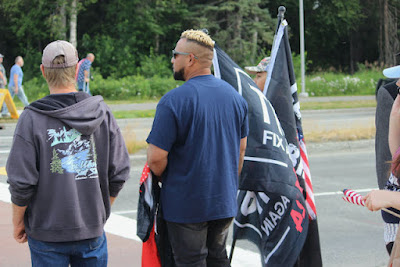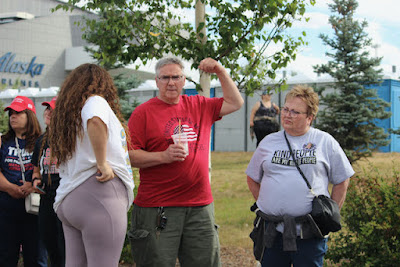It's Thursday. The Refugee Assistance and Immigration Service of the Catholic Social Services in Anchorage has a farm - Grow North Farm - where I subscribe for weekly veggie pickups over the summer. It's about 7.4 km or or a bit over 9 miles round trip. I can do much of it on wooded bike paths. But eventually I get to a quiet residential street in Airport Heights.
My first hint was a police car a block to the east. But then as I headed down the street there were more police cars. Lots of them. My first reaction was a bad crash, but I'm on a bike and I can go around on the sidewalk if necessary. But then I got within about 20 feet of the cars and police behind them, yelling at someone I couldn't see. But I could see that at least one officer had a gun pointed over the car. As regular readers of this blog probably know, guns are not a fascination of mine. But one of the benefits of blogging is that I learn new things. Here's an image of shotguns I got when I googled 'police guns'. What I saw most resembled one of the circled guns, probably the bottom one, because he was holding it and I saw that box magazine as well. (Based on the pictures and interactive description from here.) Of course, I'm just guessing from my brief look and googling now.Pages
- About this Blog
- AIFF 2025
- AIFF 2024
- AK Redistricting 2020-2023
- Respiratory Virus Cases October 2023 - ?
- Why Making Sense Of Israel-Gaza Is So Hard
- Alaska Daily COVID-19 Count 3 - May 2021 - October 2023
- Alaska Daily COVID-19 Count - 2 (Oct. 2020-April 2021)
- Alaska Daily COVID-19 Count 1 (6/1-9/20)
- AIFF 2020
- AIFF 2019
- Graham v Municipality of Anchorage
- Favorite Posts
- Henry v MOA
- Anchorage Assembly Election April 2017
- Alaska Redistricting Board 2010-2013
- UA President Bonus Posts
- University of Alaska President Search 2015
Thursday, July 11, 2024
Biking For Veggies Gets Me Into Police Blockade
Monday, December 18, 2023
More Waste In Packaging
Waste in packaging is another thing that has become normalized. Unless it's egregious, we just wade our way through it, without even thinking about it.
I felt this one qualified as egregious.
The pills came in these three plastic bottles inside the box behind.
That's about 1/5 of the bottle. There were three bottles, so only 1/15 of the bottles' volume was actually needed for the pills. That's not counting the box the three bottles were packaged in.
So the contents needed about 7% of the packaging (again, not counting the box this was all in.) So about 93% of the packaging was unnecessary.
OK, I get that stores don't want to sell things so small that it's easy for a shopper to put something into a pocket or purse without paying. There have to be more creative solutions to stopping shoplifting. If humans can figure out how to get to the moon, they can figure out how to not pollute the earth with excessive packaging.
I'd also note a story in the LA Times Sunday. Mike Hiltzik wrote a follow up to the big story earlier this year that stores were losing $45 billion to organized crime shoplifting.
Politicians and the media both repeated the fabricated number without question. And law enforcement agencies love it because such stories help them get ever increasing budgets to fight crime. But for them crime means the guy who shoplifts $30 worth of groceries, not companies that steal billions from their employees and customers.
Why do I add all these other issues to a simple story about badly packaged pills? Cause everything has a context. Telling stories without the larger context is just relating miscellaneous anecdotes. There's a lot more context for this pill story, but I'm just adding a little here so that readers at least think about the larger context and maybe even add more themselves.
.
Sunday, April 30, 2023
$229 Million Settlement Is More Than 1/3 Of Santa Monica's Budget For Sex Offenses
The Richard Winton in the LA Times writes this week: (the link should be accessible)
"This week, Santa Monica settled more lawsuits, bringing its total payout to $229.285 million — the most costly single-perpetrator sexual abuse disbursement for any municipality in the state."
Imagine what Santa Monica could have done for poor families, for the homeless, for schools, for health care, for $229 million. That's more than 1/3 of the total Santa Monica budget for 2022-2023!
From the City of Santa Monica, 2022:
"The total adopted budget for the City for FY 2022-23 is $665.4 million."
There's a lot to untangle in this story. I've got other posts in draft form lined up, but this one tugs at a number of issues I've been mulling over. With good administration, this shouldn't happen. With good accountability mechanisms this shouldn't have happened for so long. There are ways to, if not totally prevent such things, certainly to minimize their impact. But there are also other societal issues that need to be addressed, particularly how we deal with pedophiles. So let's look at some of the issues here.
1. The Cost of poor oversight
One study said it was $3 billion over the last ten years. That's just police! That's an average of $300 million per year. But I'm guessing with this single, one quarter of a billion dollar settlement, almost the average annual cost reported in this study, either that $3 billion figure is low, or awards are getting higher.
But the cost isn't just in money. The costs include:
- impacts on the lives of people who were harmed by the police and others. In the Santa Monica case over 200 kids have reported the employee abused them. Eighty were part of the settlement
- impacts on public safety since police were were spending time abusing citizens instead of protecting them, when people are wrongly convicted, the actual perpetrator isn't apprehended
- impacts on trust in government - among those abused and their families and among the general public when these crimes and settlements are publicized
- opportunity costs - the costs of things this money could have done (though one of the reports says most of this comes from insurance companies, which means all other organizations pay higher insurance rates, and I'd guess it spills over to the rest of us paying car, health, and other insurance
2. Why we don't see
Most people see what they want to see.
"The confirmation bias is a cognitive bias that causes people to search for, favor, interpret, and recall information in a way that confirms their preexisting beliefs. For example, if someone is presented with a lot of information on a certain topic, the confirmation bias can cause them to only remember the bits of information that confirm what they already thought."
We also have a truth bias. Certainly honest people have a tendency to assume others are honest as well. (And there is evidence that most people are basically honest.)
So adding these two tendencies together, we tend to discount indicators of trouble and hold on to more positive interpretations of the behavior we see. Especially of a person we've known and respected over the years. "Nah, he couldn't have done that."
And the people whose behavior is problematic are often (I'm guessing here) quite capable of giving us believable stories to explain away the problems. This is why it's often a good idea to have outsiders, people who don't know the people involved, come in to investigate problems.
But we also have negative biases. People who complain might be part of an out group - many of the kids in the Santa Monica case were from poor, immigrant families whose parents might fear deportation if they report and are less likely to be believed if they report.
Most people, I would argue, take a long time before they realize that something is seriously wrong. And then it takes a long time to report it. How long did it take you to acknowledge that your (car, toilet, spouse) had a problem. Then once you accepted it, how long to take action to fix it.
"But his biggest claim to fame was his work as a volunteer in the Police Activities League, where, beginning in the late 1980s, he worked with boys and girls in the nonprofit’s after-school program.
Uller was a familiar face at the PAL center that served Santa Monica’s Latino neighborhoods, often traveling in a police vehicle and befriending generations of youths.
It took decades to uncover that Uller was a sexual predator, the center of a stunning series of crimes that destroyed the lives of children and exposed grave questions as to why it took so long for authorities to uncover what he was doing."
3. Why why don't act when we do see
Humans seem to have a basic loyalty built in to one's 'group.' Betraying family, friends, and community (church, work group, etc.) are seen as moral violations and we have lots of negative names for people who do that - snitch, tattletale, traitor, stool-pigeon, etc. Among law enforcement agencies, this is often known as "the blue wall of silence."
Competing against that loyalty, we have the Rule of Law - a set of moral expectations for people living in a community, in a society.
When group loyalty comes in conflict with rule of law, individuals face a moral quandary. Which set of rules should one follow? We recognize this in the law with rules that allow spouses to not testify against each other, that ban nepotism and other forms of conflict of interest. I'd argue that the group loyalty is built into our genes, our emotional make up. The rule of law is something we learn logically. And strong emotion generally beats out logic.
“You have to understand in this liberal city, this is a Black and brown part of the city, and no one in the government was watching out for our kids. The Pico neighborhood was marginalized in that era,” said De la Torre, noting that Uller’s abuse occurred “under the shield of law enforcement” and “not one person lost a job” in response to the oversight.
Reporting people in our in-group for breaches of the rule of law has real, immediate consequences on our families, our social circle, and even on our employment.
This conflict keeps many from speaking up, even when they see wrong doing. If you've ever lied to protect a friend, a family member, or someone else you have a close bond with, you understand what I'm talking about.
3. When Good Employees Also Do Bad
Seeing wrongdoing becomes particularly difficult when
- the employee is otherwise exemplary in their job performance
"In nearly three decades as a civilian employee with the Santa Monica Police Department and the city, Eric Uller was considered a standout public servant who won awards for his technological innovations."
- has work activities where they work independently, where supervision is not close - such as working with youth after school. (I should mention I was an after school playground director at an elementary school to help pay for college, and I was usually alone with the kids, without supervision. No, I didn't abuse that independence, and I suspect most people don't.)
4. How the US deals with 'wrong' sex
Right now in the US, there probably aren't many people considered lower than pedophiles. Gay sex used to have a similar stigma (which, given all the anti-trans laws were seeing introduced across the US now), isn't completely gone either. Sex and marriage between people of different races was also illegal. Despite a US Supreme Court ruling banning such laws,
"As of February 3, 2021, seven states still required couples to declare their racial background when applying for a marriage license, without which they cannot marry. The states are Connecticut, Delaware, Kentucky, Louisiana, Minnesota (since 1977),[42] New Hampshire, and Alabama."
There are good reasons for our laws against adults having sex with children, though the lines get blurry as the age of the child gets higher and the age of the adult gets lower. There's no question about why a 30 year old shouldn't have sex with a nine year old. Yet according to NBC news in 2019:
"Idaho and California are not alone in not having a minimum marriage age. A majority of states, which issue marriage licenses, allow 16- and 17-year-olds to marry, a few allow 14-year-olds, and 13 states have no minimum marriage age as of September. Before 2016 — when Virginia became the first state to put its marriage age into law — more than half of the states had no minimum marriage age fixed by statute."
While it appears there are requirements for parental or court approval, it does appear that there are no minimum ages in these states. I would guess that the proponents for allowing young marriage often argue that pregnant girls should be allowed to marry the fathers - but I didn't look that up and could be wrong.
My point in all this is that some sexual preferences are seen as evil while others are perfectly ok. (Though for many, still, sex outside of marriage is frowned on.)
People don't choose at some point in their lives to be sexually stimulated by one type of sexual encounter or another. Some argue some attractions are genetic. Some argue that sexual preferences are based on early sexual encounters.
People with heterosexual preferences would appear to be the luckiest. These are what our society condones. While some people frown on any sex out of marriage, heterosexual sex among the consenting, unmarried seems to be alive and well. The kinkier the sex and the more people will disapprove. As people's preferences stray from heterosexual, single partner sex, there is more disapproval.
But imagine if a person were forbidden from having unmarried heterosexual sex and punished if they did. Buzzweed lists a number of ways women have been punished in the US, some of which involved sexual acts.
For many people the sexual urge is very powerful, even irresistible. I suspect that is probably the case of people who view child pornography and who engage in sex with children. I would only request that people who have been in situations where they could not resist their sexual urges with another person, consider what it would have been like if that other person were legally a child. Or for people who couldn't resist opening a porn site and watching porn that turned them on.
I'm not defending pedophiles. But simply labeling them monsters and locking them up forever is not a good way to reduce pedophilia. I'm only suggesting that such urges can be hard to control. And many such relationships that are considered taboo today, have in different periods of time been acceptable. And sexual practices condoned today were in past times seen as evil.
But we've evolved in our beliefs that sex should be consensual. We've evolved in our beliefs that people in positions of authority have a power in the sexual relationship that makes consent, at best, a morally difficult determination.
And we believe that adults having sex with young children is, without question, non consensual and also an example of an unbalanced power relationship.
Child pornography is a problem because children have been exploited to produce the images. Is viewing drawings of child sex as viewing photos and videos?
If AI could produce child pornography (I suspect it already can and does) without any actual children being involved, would that be ok? Some will argue that such pornography would lead to actual sexual encounters. But we really don't know how many viewers of child pornography actually go out and find victims.
My goal here is to raise the question of whether there are ways to recognize some people's sexual attraction to children, even let them indulge in pornography that didn't exploit actual children, and also figure out ways to protect children from sexual predators?
The person in this article excelled in some aspects of his job. But he had a taboo sexual attraction to children. What do you think his options were to seek help from a counselor? In many situations people who professionally learn about child abuse are mandated to report that to the authorities.
If this were not such a reviled and taboo attraction, would this employee have been able to seek and get counseling and treatment that would have helped him deal with his inappropriate attractions? Psych Central says:
"Pedophilic disorder treatment options include medication, hormone, and psychosocial therapies. “Stigma often discourages people from seeking help, but resources are available."
Most mental health problems are stigmatized making it difficult for people to seek help. Pedophilia is probably one of the most stigmatized.
That leads me to offer a few options for reducing sex between adults and children.
Some ways to lessen the incidence of work related pedophilia:
- General education to let people know that there are treatments for people sexually attracted to children and reducing the stigma connected to it so people are more likely to seek such treatment (I realize that this is a long term solution, since people with more common, more visible mental health problems also avoid getting help because of the stigma involved.)
- Education in schools that teaches children how to recognize inappropriate touch, acts of grooming, and steps to take when they encounter such behavior. Erin Merrin came to Alaska in 2015 and got such a program (Erin's Law) adopted, despite the obstacles set by then Senator Dunleavy, under the guise of 'parental rights.' Now Governor Dunleavy is still using 'parents rights' as a cover for trying to weaken Erin's Law. Erin's Law has been adopted in a number of states and seems like one of the more promising ways to reduce pedophilia, by educating the potential victims.
- Increased vigilance for situations where children are vulnerable to predatory adults - situations where adults work with children such as playgrounds, social services that care for children, recreational activities such as sports and Boy Scouts.
- Changing the laws that give public employees immunity for lapses at work. There do need to be protections against lawsuits or people wouldn't become public servants. I think the bulk of monetary punishment still needs to be born by the agency. But individuals who make serious mistakes, who don't report abuse they know about (not just sex related) should also have some monetary consequences.
Saturday, July 09, 2022
The Trump Folks Are Lined Up To See Their Messiah In Anchorage Today
Tuesday, June 14, 2022
Labor Shortage, Law Enforcement And Teaching In Alaska
This has been flashing at the State Troopers Headquarters at Tudor and MLK
Here are the qualifications listed online:
The minimum qualifications for the position of State Trooper Recruit/Lateral are outlined below.
General Qualifications
- Must be a citizen (including US Nationals) of the United States of America.
- Must be 21 years of age or older* at the start of the academy .
- Must be conversant in both spoken and written English.
- Most possess a high school diploma or have passed a General Education Development (GED) test.
* There is no upper age limit; if you can pass the physical fitness test and medical screening, you could be hired.
Driving
- Must possess a valid driver’s license issued within the United States or its Territories.
- Must be free of excessive moving violations and recent license actions (canceled, revoked, suspended, limited, or SR-22 requirement).
Drugs
Drug use/abuse is closely scrutinized and recent drug use may be cause for elimination from the hiring process, including:
- Marijuana use within the last year
- Use of illegal narcotics within the last ten years
- Manufacture/sale of illegal narcotics as an adult
- Illegal drug use while employed in a law enforcement position
- Prescription drug use without a prescription unless there was an immediate, pressing, or emergency medical circumstance to justify the use
Criminal History
- Adult criminal history is closely scrutinized and the following may be cause for elimination from the hiring process:
- Felony conduct as an adult
- Misdemeanor convictions within the last ten years
- Any conviction related to domestic violence
So a high school diploma or GED is all you need to get a starting salary of
In comparison, here's the salary schedule from the Anchorage Education Association Contract - teachers. This is for the 202-1022 school year. There is a bump up each year, but the highest starting salary is $55,158 and the highest top salary is $97,238.
100 SERIES – SALARIES AND BENEFITS 105 SALARY SCHEDULE
2021-2022 Salary Schedule
Step | B00 | B18 | B36 | B54 | B72 |
0 | 53,287 | 55,872 | 58,455 | 61,039 | 65,882 |
1 | 54,698 | 57,282 | 59,865 | 62,448 | 67,283 |
2 | 56,106 | 58,690 | 61,273 | 63,857 | 68,685 |
3 | 57,516 | 60,099 | 62,682 | 65,266 | 70,087 |
4 | 58,925 | 61,508 | 64,091 | 66,674 | 71,488 |
5 | 60,333 | 62,917 | 65,501 | 68,085 | 72,892 |
6 | 61,745 | 64,326 | 66,910 | 69,494 | 74,294 |
7 | 63,153 | 65,737 | 68,320 | 70,901 | 75,697 |
8 | 64,562 | 67,145 | 69,729 | 72,311 | 77,101 |
9 | 65,970 | 68,554 | 71,137 | 73,722 | 78,501 |
10 | 67,378 | 69,963 | 72,548 | 75,129 | 79,904 |
11 | - | 71,371 | 73,955 | 76,540 | 81,306 |
12 | - | 72,780 | 75,364 | 77,947 | 82,708 |
13 | - | - | 76,773 | 79,357 | 84,109 |
14 | - | - | 78,182 | 80,768 | 85,514 |
15 | - | - | 79,591 | 82,175 | 86,915 |
16 | - | - | - | 83,584 | 88,318 |
17 | - | - | - | 84,993 | 89,718 |
18 | - | - | - | - | 91,119 |
19 | - | - | - | - | 92,520 |
20 | - | - | - | - | 93,922 |
Here are the qualification requirements for an elementary school teacher:
Job Requirements
The following are required:
- A valid Alaska initial, professional, or master teaching certificate.
- Evidence of content knowledge shown by:
- a posted degree in the content area of this position; or
- a posted minor in the content area of this position; or
- passing Praxis Subject Assessments scores (formerly Praxis II) in the content area of this position; or
- a certificate endorsement in the content area of this position
INITIAL/PROGRAM ENROLLMENT TEACHER CERTIFICATE
To qualify for an Initial/Program Enrollment teacher certificate, an applicant must meet the following requirements:
- Has never held an Alaska teacher certificate
- Completion of a bachelor’s degree from a regionally or nationally accredited university;
- Current enrollment in an approved teacher preparation program as verified by a Program Enrollment form (docx) and official transcripts (Program must be completed within two (2) years of the issuance of the Initial certificate).
- Passing scores on an approved basic competency exam
- Has passing scores on an approved content area exam
- Five years of experience in the subject matter that you will be teaching;
- Offered a certified teaching position by an Alaska public school district.







































